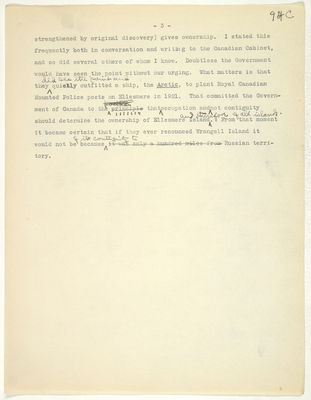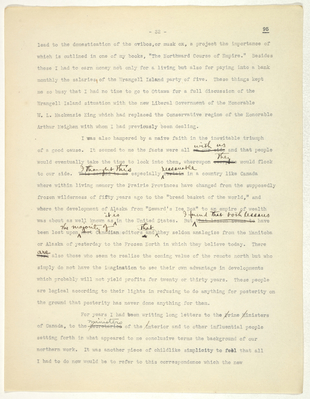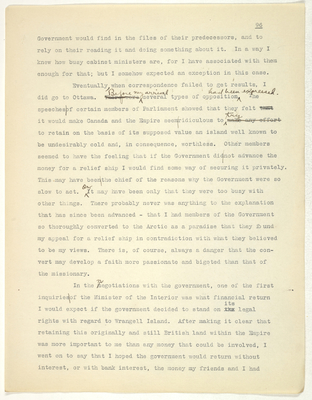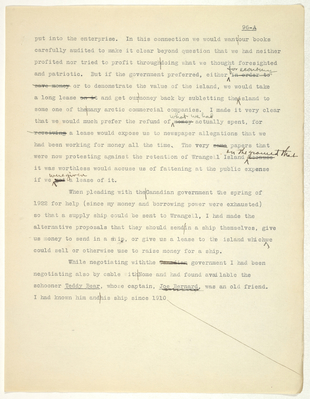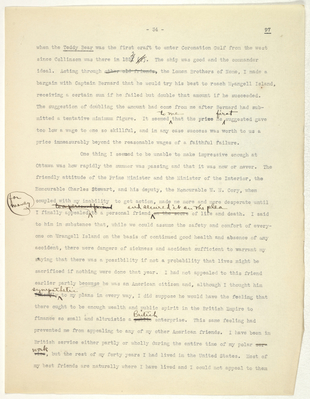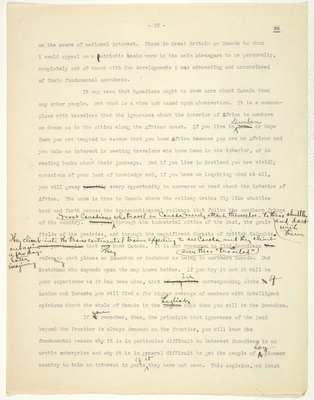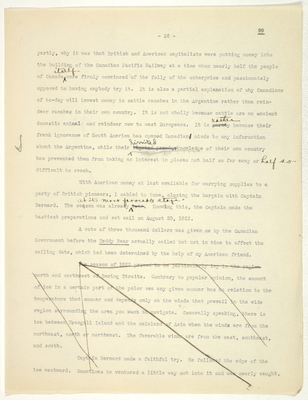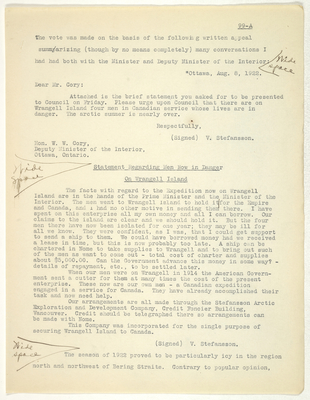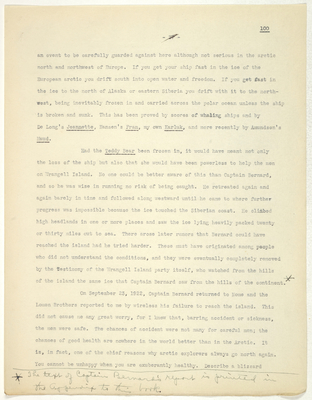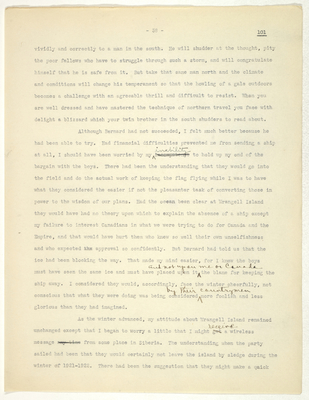Pages That Need Review
stefansson-wrangel-09-27
stefansson-wrangel-09-27-059
- 3 - 94C
strengthened by original discovery) gives ownership. I stated this frequently both in conversation and writing to the Canadian Cabinet, and so did several others of whom I know. Doubtless the Government would have seen the point without our urging. What matters is that they did sea the point and quietly outfitted a ship, the Arctic, to plant Royal Canadian Mounted Police posts on Ellesmere in 1921. That committed the Government of Canada to the position principle that oceupation and not contiguity should determine the ownership of Ellesmere Island and therefore of all islands. From that moment it became certain that if they ever renounced Wrangell Island it would not be because of its contiguity to it was only a hundred miles from Russian territory.
stefansson-wrangel-09-27-060
- 32 - 95
lead to the domestication of the ovibos,or musk ox, a project the importance of which is outlined in one of my books, "The Northward Course of Empire." Besides these I had to earn money not only for a living but also for paying into a bank monthly the salaries of the Wrangell Island party of five. These things kept me so busy that I had no time to go to Ottawa for a full discussion of the Wrangell Island situation with the new Liberal Government of the Honorable W. L. Mackenzie King which had replaced the Conservative regime of the Honorable Arthur Meighen with whom I had previously been dealing.
I was also hampered by a naive faith in the inevitable triumph of a good cause. It seemed to me the facts were all on our side with us and that people would eventually take the time to look into them, whereupon everyone they would flock to our side. This occured to me I thought this especially certain in a country like Canada where within living memory the Prairie Provinces have changed from the supposedly frozen wilderness of fifty years ago to the "bread basket of the world," and where the development of Alaska from "Seward’s Ice Box” to an empire of wealth was about as well known as it is in the United States. But I found that both lessons that lesson seems to have been lost upon the majority of Canadian editors and that they seldom analogize from the Manitoba or Alaska of yesterday to the Frozen North in which they believe today. There were are also those who seem to realize the coming value of the remote north but who simply do not have the imagination to see their own advantage in developments which probably will not yield profits for twenty or thirty years. These people are logical according to their lights in refusing to do anything for posterity on the ground that posterity has never done anything for them.
For years I had been writing long letters to the prime ministers of Canada, to the Secretaries ministers of the interior and to other influential people setting forth in what appeared to me conclusive terms the background of our northern work. It was another piece of childlike simplicity to feel that all I had to do now would be to refer to this correspondence which the new
stefansson-wrangel-09-27-061
96
Government would find in the files of their predecessors, and to rely on their reading it and doing something about it. In a way I knew how busy cabinet ministers are, for I have associated with them enough for that; but I somehow expected an exception in this case.
Eventually when correspondence failed to get results, I
did go to Ottawa. There were Before my arrival several types of opposition had been expressed. The speechesof certain members of Parliament showed that tney felt that it would make Canada and the Empire seemridiculous to try make any effort to retain on the basis of its supposed value an island well known to be undesirably cold, and, in consequence, worthless. Other members seemed to have the feeling that if the Government didnot advance the money for a relief ship I would find some way of securing it privately. This may have beenthe chief of the reasons why the Government were so slow to act. Or it may have been only that they were too busy with other things. There probably never was anything to the explanation that has since been advanced - that I had members of the Government so thoroughly converted to the Arctic as a paradise that they found my appeal for a relief ship in contradiction with what they believed to be my views. There is, of course, always a danger that the convert may develop a faith more passionate and bigoted than that of the missionary.
In the mnegotiations with the government, one of the first inquiriesof the Minister of the Interior was what financial return I would expect if the government decided to stand on the its legal rights with regard to Wrangell Island. After making it clear that retaining this originally and still British land within the Empire was more important to me than any money that could be involved, I went on to say that I hoped the government would return without interest, or with bank interest, the money my friends and I had
stefansson-wrangel-09-27-062
96-A
put into the enterprise. In this connection we would wantour books carefully audited to make it clear beyond question that we had neither profited nor tried to profit throughdoing what we thought foresighted and patriotic. But if the government preferred, either for economy in order to save money or to demonstrate the value of the island, we would take a long lease on it and get ourmoney back by subletting theisland to some one of themany arctic commercial companies. I made it very clear that we would, much prefer the refund of what we had money actually spent, for receiving a lease would expose us to newspaper allegations that we had been working for money all the time. The very same papers that were now protesting against the retention of Wrangell Island on the ground that because it was worthless would accuse us of fattening at the public expense if we were given got a lease of it.
When pleading with theCanadian government the spring of 1922 for help (since my money and borrowing power were exhausted) so that a supply ship could be sent to Wrangell, I had made the alternative proposals that they should sendin a ship themselves, give us money to send in a ship, or give us a lease to the island whichwe could sell or otherwise use to raise money for a ship.
While negotiating withthe Canadian government I had been negotiating also by cable withNome and had found available the schooner Teddy Bear, whose captain, Joe Bernard, was an old friend. I had known him andhis ship since 1910
stefansson-wrangel-09-27-063
34 - 97
when the Teddy Bear was the first craft to enter Coronation Gulf from the west since Collinson was there in 18512 (?). The ship was good and the commander ideal. Acting through other old friends the Lomen Brothers of Nome, I made a bargain with Captain Bernard that he would try his best to reach Wrangell Island, receiving a certain sum if he failed but double that amount if he succeeded. The suggestion of doubling the amount had come from me after Bernard had submitted a tentative minimum figure. It seemed to me that the price he first suggested gave too low a wage to one so skillful, and in any case success was worth to us a price immeasurably beyond the reasonable wages of a faithful failure.
One thing I seemed to be unable to make impressive enough at Ottawa was how rapidly the summer was passing and that it was now or never. The friendly attitude of the Prime Minister and the Minister of the Interior, the Honourable Charles Stewart, and his deputy, the Honourable W. W. Cory, when coupled with my inability to get action, made me more and more desperate until I finally appealed for merely to a personal friend to a personal friend and secured it on the plea on the score of life and death. I said to him in substance that, while we could assume the safety and comfort of everyone on Wrangell Island on the basis of continued good health and absence of any accident, there were dangers of sickness and accident sufficient to warrant my saying that there was a possibility if not a probability that lives might be sacrificed if nothing were done that year. I had not appealed to this friend earlier partly because he was an American citizen and, although I thought him friendly sympathetic to my plans in every way, I did suppose he would have the feeling that there ought to be enough wealth and public spirit in the British Empire to finance so small and altruistic a public British enterprise. This same feeling had prevented me from appealing to any of my other American friends. I have been in British service either partly or wholly during the entire time of my polar service work, but the rest of my forty years I had lived in the United States. Most of my best friends are naturally where I have lived and I could not appeal to them
stefansson-wrangel-09-27-064
- 35 - 98
on the score of national interest. Those in Great Britain or Canada to whom I could appeal on a patriotic basis were in the main strangers to me personally, completely out of touch with the developments I was advocating and unconvinced of their fundamental soundness.
It may seem that Canadians ought to know more about Canada than any other people. But that is a view not based upon observation. It is a commonplace with travelers that the ignorance about the interior of Africa is nowhere so dense as in the cities along the African coast. If you live in Durban Natal or Cape Town you are tempted to assume that you know Africa because you are an African and you take no interest in meeting travelers who have been in the interior, or in reading hooks about their journeys. But if you live in Scotland you are vividly conscious of your lack of knowledge and, if you have an inquiring mind at all, you will grasp every opportunity to converse or read about the interior of Africa. The same is true in Canada where the railway trains fly like shuttles back and forth across the transcontinental railways that follow the southern fringe of the country. You pass Most Canadians who travel in Canada merely attach themselves to these shuttles and dart with them through the industrial cities of the East, the grain fields of the prairies, and through the magnificent forests of British Columbia. and you imagine They clim into the [trains] continental trains expecting to see Canada and they climb out again a few days later [inuaqiurry] that you they know Canada. It is not uncommon to find even these "traveled" Canadians who referring to such places as Edmonton or Cochrane as being in northern Canada. Our Scotchman who depends upon the map knows better. If you try it out it will be your experience as it has been mine, that if you visit in corresponding clubs in of London and Toronto you will find a far higher average of members with intelligent opinions about the whole of Canada in the English London club than you will in the Canadian.
If we you remember, then, the principle that ignorance of the land beyond the frontier is always densest on the frontier, you will know the fundamental reason why it is in particular difficult to interest Canadians in an arctic enterprise and why it is in general difficult to get the, people of any a pioneer country to take an interest in parts of it they have not seen. This explains, at least
stefansson-wrangel-09-27-065
- 36 - 99
partly, why it was that British and American capitalists were putting money into the building of the Canadian Pacific Railway at a time when nearly half the people of Canada itself were firmly convinced of the folly of the enterprise and passionately opposed to having anybody try it. It is also a partial explanation of why Canadians of to-day will invest money in cattle ranches in the Argentine rather than reindeer ranches in their own country. It is not wholly because cattle are an ancient domestic animal and reindeer new to west Europeans. It is partly rather because their frank ignorance of South America has opened Canadians minds to any information about the Argentine, while their bigoted pseudo limited of their own country has prevented them from taking an interest in places not half so far away or half so difficult to reach.
With American money at last available for carrying supplies to a party of British pioneers, I cabled to Nome, closing the bargain with Captain Bernard. The season was already at its most favorable stage into. Knowing this, the Captain made the hastiest preparations and set sail on August 20, 1922.
A vote of three thousand dollars was.given me by the Canadian Government before the Teddy Bear actually sailed but not in time to affect the sailing date, which had. been determined by the help of my American friend.
The season of 1922 proved to be particularly icy in the region north and northwest of Bering Straits. Contrary to popular opinion, the amount of ice in a certain part of the polar sea any given summer has no relation to the temperature that summer and depends only on the winds that prevail in the wide region surrounding the area you want to navigate. Generally speaking ,there is ice between Wrangell Island and the mainlana of Asia when the winds are from the northeast, north or norhwest. The favorable winds are from the east, southeast, and south.
Captan Bernard made a faithful try. He followed the edge of the ice westward. Sometimes he ventured a little way out into it and wa. nearly caught.
stefansson-wrangel-09-27-066
99-A
the vote was made on the basis of the followin g written appeal summparizing (though by no means completely) many conversations I had had both with the Minister and Deputy Minister of the Interior:
Wide space
"Ottawa, Aug. 8, 1922.
Dear Mr. Cory:
Attached is the brief statement you aslced for to be presented to Council on Friday. Please urge upon Council that there are on Wrangell Island four men in Canadian service whose lives are in danger. The arctic summer is nearly over.
Respectfully,
(Signed) V. Stefansson.
Hon. W. W. Cory, Deputy Minister of the Interior, Ottawa, Ontario.
Wide space
Statement Regarding Men Now in Danger On Wrangell Island
The facts with regard to the Expedition now on Wrangell Island are in the hands of the Prime Minister and the Minister of the Interior. The men vrent to Wrangell Island to hold itfor the Empire and Canada, and I had no other motive in sending them there. I have spent on this enterprise all my own money and all I can borrow. Our claims to the island are clear and we should hold it. But the four men there have now been isolated for one year; they may be ill for all we know. They were confident, as I was, that I could get support to send a ship to them. We could have borrowed money had we received a lea.se in time, but this is now probably too late. A ship can be chartered in Nome to take supplies to Wrangell and to bring out such of the men as want to come out - total cost of charter and supplies about $5,000.00. Can the Government advance this money in some way? - details of repayment, etc., to be settled later.
When our men were on Wrangell in 1914 the American Government sent a cutter for them at many times the cost of the present enterprise. These now are our own men - a Canadian expedition engaged in a service for Canada. They have already accomplished their task and now need help.
Our arrangements are all made through the Stefansson Arctic Exploration and Development Company, Credit Foncier Building, Vancouver. Credit should be telegraphed there so arrangements can be made with Nome.
This Company was incorporated for the single purpose of securing Wrangell Island to Canada.
(Signed) V. Stefansson.
Wide space
The season of 1922 proved to be particularly icy in the region north and northwest of Bering Straits. Contrary to popular opinion,
stefansson-wrangel-09-27-068
- 37 - 100
an event to be carefully guarded against here although not serious in the arctic north and northwest of Europe. If you get your ship fast in the ice of the European arctic you drift south into open water and freedom. If you get fast in the ice to the north of Alaska or eastern Siberia yoix drift with it to the northwest, being inevitably frozen in and carried across the polar ocean unless the ship is broken and sunk. This has been proved by scores of whaling ships and by De Long's Jeannette, Nansen's Fram, my own Karluk, and more recently by Amundsen's Maud.
Had the Teddy Bear been frozen in, it would have meant not only the loss of the ship but also that she would have been powerless to help the men on Wrangell Island. No one could be better aware of this than Captain Bernard, and so he was wise in running no risk of being caught. He retreated again and again barely in time and followed along westward until he came to where further progress was impossible because the ice touched the Siberian coast. He climbed high headlands in one or more places and saw the ice lying heavily packed twenty or thirty miles out to sea. There arose later rumors that Bernard could have reached the island had he tried harder. These must have originated among people who did not understand the conditions, and they were eventually completely removed by the testimony of the Wrangell Island party itself, who watched from the hills of the island the same ice that Captain Bernard saw from the hills of the continent.
On September 23, 1922, Captain Bernard returned to Nome and the Lomen Brothers reported to me by wireless his failure to reach the island. This did not cause me any great worry, for I knew that, barring accident or sickness, the men were safe. The chances of accident were not many for careful men; the chances of good health are nowhere in the world better than in the Arctic. It is, in fact, one of the chief reasons why arctic explorers always go north again. You cannot be unhappy when you are exuberantly healthy. Describe a blizzard
The text of Captian Bernard's report is printed in the Appendix to this book.
stefansson-wrangel-09-27-069
- 38 - 101
vividly and correctly to a man in the south. He will shudder at the thought, pity the poor fellows who have to struggle through such a storm, and will congratulate himself that he is safe from it. But take that same man north and the climate and conditions will change his temperament so that the howling of a gale outdoors becomes a challenge with an agreeable thrill and difficult to resist. When you are well dressed and have mastered the technique of northern travel you face with delight a blizzard which your twin brother in the south shudders to read about.
Although Bernard had not succeeded, I felt much better because he had been able to try. Had financial difficulties prevented me from sending a ship at all, I should have been worried by my incompetance inability to hold up my end of the bargain with the boys. There had been the understanding that they would go into the field and do the actual work of keeping the flag flying while I was to have what they considered the easier if not the pleasanter task of converting those in power to the wisdom of our plans. Had the ocean been clear at Wrangell Island they would have had no theory upon which to explain the absence of a ship except my failure to interest Canadians in what we were trying to do for Canada and the Empire, and that would have hurt them who knew so well their own unselfishness and who expected the approval so confidently. But Bernard had told us that the ice had been blocking the way. That made my mind easier, for I knew the boys must have seen the same ice and must have placed upon it and not upon me or Canada the blame for keeping the ship away. I considered they would, accordingly, face the winter cheerfully, not conscious that what they were doing was being cousidered by thier countrymen foolish and less glorious than they had imagined.
As the winter advanced, my attitude about Wrangell Island remained unchanged except that I began to worry a little that I might got receive a wireless message any time from some place in Siberia. The understanding when the party sailed had been that they would certainly not leave the island by sledge during the winter of 1921-1922. There had been the suggestion that they might make a quick
